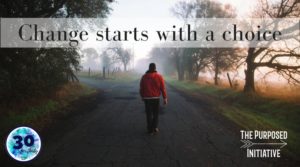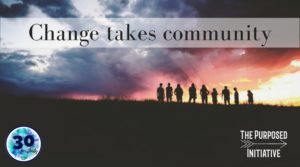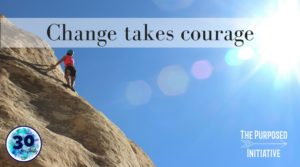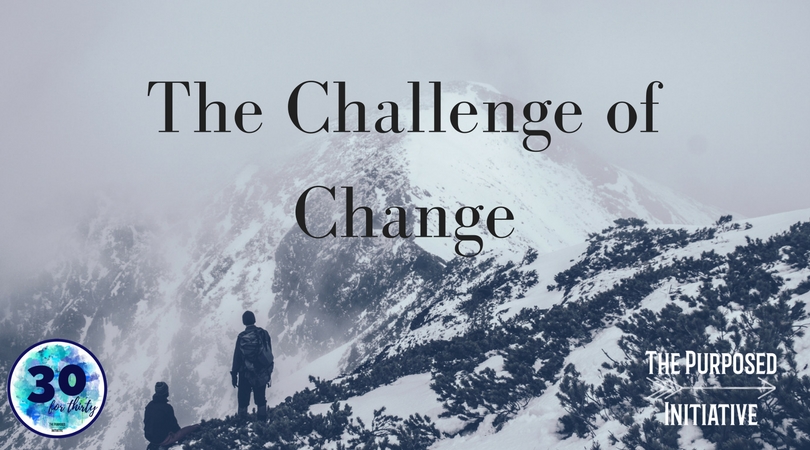Change. Some people love it, some people hate it, and the mere sound of the word can send many people into a spin. It’s a concept which has inspired a library of books, a plethora of motivational speakers with miracle solutions and countless theories and principles and processes. When you talk to most people about the issue of domestic violence, almost unanimously they will agree that something needs to change. Things cannot stay as they are, we cannot keep having one woman killed each week by a current or former partner. So how do we make change? When change is such a complex process, and domestic violence is such a complicated issue, how do we move forward? To answer those questions comprehensively would take a book (don’t worry, I’m not going to write that much here), but today I want to touch briefly on a few elements of achieving change and how we can apply them.
 Change starts with a choice. This may seem like a statement of the obvious, but in order to tackle an issue like domestic violence and see real change we all need to make the choice that things need to change. It’s not enough for us to leave it up to those directly involved or those in positions of authority to make the change, each and every one of us need to take responsibility. We all need to say it’s not ok. We all need to call out inappropriate or unsafe behaviour when we see it. We all need to offer support to those who need it. To address an issue of this magnitude we all need to be part of the solution.
Change starts with a choice. This may seem like a statement of the obvious, but in order to tackle an issue like domestic violence and see real change we all need to make the choice that things need to change. It’s not enough for us to leave it up to those directly involved or those in positions of authority to make the change, each and every one of us need to take responsibility. We all need to say it’s not ok. We all need to call out inappropriate or unsafe behaviour when we see it. We all need to offer support to those who need it. To address an issue of this magnitude we all need to be part of the solution.
 Change takes community. Once we have made the choice for change as individuals, the next step is to work together as a community to make the change happen. No single person can deal with this issue, but when we work together as a community we can see changes happen. A single voice can be drowned out by a louder opponent, a community singing as a chorus can overwhelm the noise of opposition. An individual will not have the financial or personal resources to respond to the problems, a community together can pool their resources to help those in need.
Change takes community. Once we have made the choice for change as individuals, the next step is to work together as a community to make the change happen. No single person can deal with this issue, but when we work together as a community we can see changes happen. A single voice can be drowned out by a louder opponent, a community singing as a chorus can overwhelm the noise of opposition. An individual will not have the financial or personal resources to respond to the problems, a community together can pool their resources to help those in need.
 Change takes coordination. Domestic violence is a complicated issue, so dealing with it takes a comprehensive response. Changing laws isn’t enough. Increasing policing isn’t enough. Even victim support on its own isn’t enough. We need programs and people at the coalface supporting and caring for the victims of domestic violence to help them recover, heal and get back on their feet. We need programs to work with offenders to help them change their attitudes and behaviours. We need justice systems that provide safety for victims and consequences for offenders. And we need education for future generations not just to tell them that violence is wrong, but to teach them how to have safe and healthy relationships that manage conflict in appropriate ways. All these elements (and probably more) need to be in place if we are to rid our society of domestic violence.
Change takes coordination. Domestic violence is a complicated issue, so dealing with it takes a comprehensive response. Changing laws isn’t enough. Increasing policing isn’t enough. Even victim support on its own isn’t enough. We need programs and people at the coalface supporting and caring for the victims of domestic violence to help them recover, heal and get back on their feet. We need programs to work with offenders to help them change their attitudes and behaviours. We need justice systems that provide safety for victims and consequences for offenders. And we need education for future generations not just to tell them that violence is wrong, but to teach them how to have safe and healthy relationships that manage conflict in appropriate ways. All these elements (and probably more) need to be in place if we are to rid our society of domestic violence.
 Change takes courage. Any time we want to lead significant cultural change it takes courage. Courage to take a stand when opposition comes. Courage to work together and being willing to share the load. Courage to believe that change is possible despite those who doubt. Courage to accept that change has a cost and be willing to pay that cost in order to see the change occur. The cost might be in giving our time, in using our talents, or in contributing our finances, but in order to see real, substantial change, we need to be willing to give.
Change takes courage. Any time we want to lead significant cultural change it takes courage. Courage to take a stand when opposition comes. Courage to work together and being willing to share the load. Courage to believe that change is possible despite those who doubt. Courage to accept that change has a cost and be willing to pay that cost in order to see the change occur. The cost might be in giving our time, in using our talents, or in contributing our finances, but in order to see real, substantial change, we need to be willing to give.
So what now? Will you join us in taking a stand against domestic violence and trying to bring about change? The 30 for 30 campaign aims to support and encourage women experiencing homelessness as a result of family violence. So far we have reached just over half our goal of putting together 30 bags of essential items for these women, if you’d like to help us reach our goal, you can click here. There are also other organisations you can support like Our Watch and the Luke Batty Foundation that are raising awareness and pushing for cultural and political change. Or maybe you will look into the needs in your local area and find a way to contribute. Whatever you do, we challenge you today to make the decision to take a stand. Family Violence is not something that will go away if we sit back and leave it up to “someone” to fix, it is something that we all need to take a stand against if we want to see real change.


Recent Comments